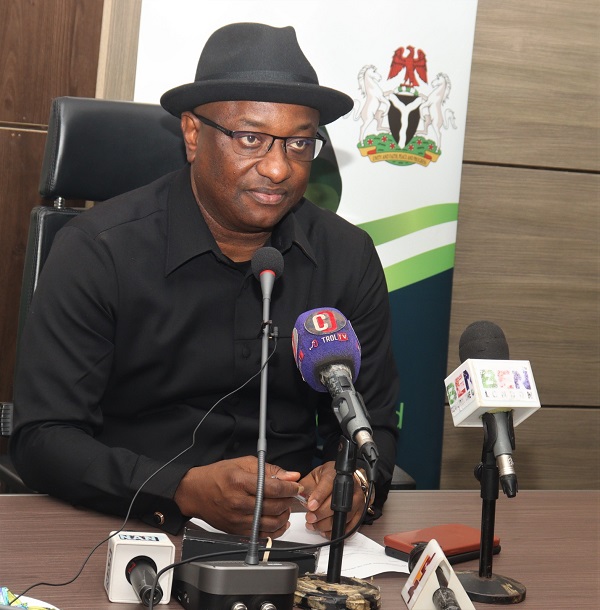
The Minister of Aviation and Aerospace Development, Mr. Festus Keyamo SAN, has unveiled the 2024 Seasonal Climate Prediction (SCP) through the Nigerian Meteorological Agency (NiMet), as part of the ministry’s support for President Bola Tinubu’s ‘Renewed Hope’ agenda.
The SCP aims to provide early warning critical information for decision-making across all sectors of the Nigerian economy.
During the public presentation of the 2024 SCP in Abuja, themed “Facilitating a Weather-Resilient Economy through Early Warning for All to Foster Renewed Hope and Sustainable Development,” Keyamo revealed predictions indicating a delayed onset of rains in some parts of the country, particularly in the north-central states. The normal onset is expected to occur over the northern states, with Borno, Abia and Akwa Ibom predicted to experience an early onset compared to their long-term averages.
Keyamo emphasised the importance of the SCP, stating, “The launch of the 2024 Seasonal Climate Prediction today signifies an important contribution to our journey towards a more resilient and sustainable future.” The SCP was translated into Hausa, Igbo, Yoruba and Pidgin to ensure widespread dissemination and increased access to critical climate information.
The minister highlighted the profound effects of weather and climate on various sectors, including aviation, agriculture, maritime and blue economy, water resources, natural resources, energy, disaster risk management and infrastructure investments.
He stressed the crucial role of meteorological information in supporting food security, reducing risks, improving livelihoods, and building resilience against weather-related challenges. The SCP contains essential information such as the predicted start and end dates of the growing season, expected annual rainfall, temperature forecasts, malaria and meningitis vigilance and forecasts for dry spells and little dry seasons. It also outlines the socio-economic implications of the predictions.
In the face of the global climate crisis, Keyamo emphasised NiMet’s vital role, stating, “Our ability to adapt and mitigate the impacts of climate change rests on the foundation of accurate predictions and informed decision-making.” He noted that 2023 was documented as the hottest year ever recorded globally, surpassing previous records by a considerable margin.
Keyamo underscored the importance of accurate weather forecasts for the aviation industry, where flight safety and efficient air transport operations heavily depend on precise weather information. He acknowledged NiMet’s continuous efforts to enhance aviation-specific weather services through investments in meteorological weather stations, satellite data and numerical weather prediction (NWP).
The minister highlighted the close relationship between rainfall patterns in West Africa and changes in sea surface temperature (SST) over the tropical Pacific Ocean. The 2024 SCP utilises a standard approach considering the teleconnection between SST anomalies in both the Pacific and Atlantic oceans and the rainfall regime over Nigeria. The predictions are based on a strong El Niño phase of the El Niño southern oscillation (ENSO) in the first half of 2024, with the projection that the Neutral phase will likely persist for the later part of the year.
Keyamo urged NiMet management to collaborate with government agencies, private sectors, non-governmental organisations and communities to collectively build a climate-resilient nation.
Highlights of the 2024 SCP:
- Delayed onset of rains in some parts of the country, especially the north-central states.
- Normal onset over the northern states.
- Borno, Abia and Akwa Ibom are predicted to have an early onset compared to their long-term averages.
- Early end-of-the-season predicted for parts of Yobe, Jigawa, Sokoto, Kebbi, Kano, Kaduna, Plateau, Nasarawa Taraba, Gombe, Bauchi, Cross River, Ebonyi, Ogun and Lagos states.
- Late cessation is predicted over the southern states of Bayelsa, Rivers, Akwa Ibom, Ondo, Ekiti and parts of Edo, Delta, Ogun, Oyo, Kogi, Kwara, FCT, Niger and Kaduna.
- Annual rainfall amount predicted to be below normal over specific states, while other parts of the country may observe normal to above-normal annual rainfall amounts.
- Most parts of the country expected to experience a shorter length of the season, except Bayelsa, Rivers and Akwa-Ibom likely to experience a longer length of the season.
- Detailed predictions for temperature, dry spells, little dry season, malaria and meningitis.
Keyamo encouraged stakeholders to evaluate the predictions thoroughly, strategically building adaptive capacity and resilience against climate variability within their respective sectors. He expressed his desire for policymakers to use the information to plan activities, allocate resources effectively, and protect citizens from the adverse impacts of weather.
The permanent secretary of the ministry, Dr. Emmanuel Meribole highlighted that SCP serves as an early warning tool, providing crucial insights into the seasonal prediction of rainfall, temperature and other variables. He emphasised the increasing importance of atmospheric predictions for socio-economic development in the face of changing climatic patterns and extreme weather events.
In his closing remarks, the chairman of the House of Representatives Committee on Aviation Technology, Thomas Ereyitomi encouraged NiMet to produce documents in local languages for wider understanding, particularly among farmers.
NiMet’s director-general, Prof. Charles Anosike, thanked the ministry for its commitment and dedication to advancing understanding of weather and climate patterns, as reflected in the annual SCP publication. NiMet produces the SCP to fulfil its mandate of providing accurate, timely and quality weather and climate information to advise the Federal Government and Nigerians on weather-related issues. The SCP investigates the possible socio-economic effects of forecast climate variables for Nigeria’s weather-sensitive industries, contributing to economic growth and preventing production and infrastructure losses.

